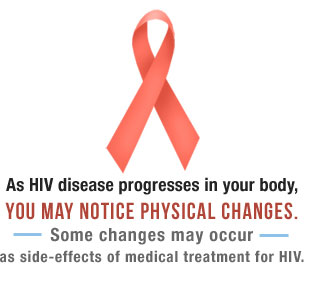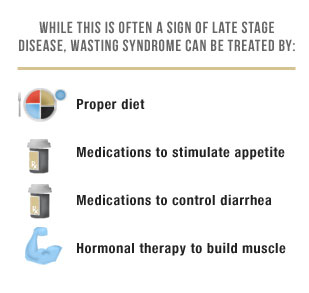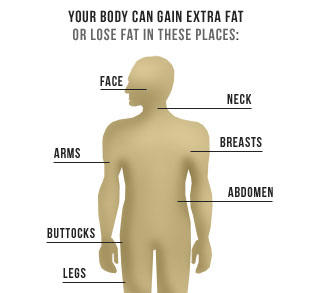Physical changes to your body
As HIV disease progresses in your body, you may notice physical changes. Some changes may occur as side-effects of medical treatment for HIV. Others may occur as a result of the impact that HIV (or AIDS) has on your body.
Body fat changes
Some medications you may take to control HIV cause changes in the way your body produces, uses, and stores fat. These changes are called lipodystrophy. This condition causes you to gain or lose fat in particular parts of your body.
You can get extra fat in the following places:
- Abdomen
- Neck
- Breasts (both men and women)
- Face
- In addition, you can also develop small deposits of fat, called lipomas, elsewhere on your body.
Other changes can occur when the fat under your skin (called subcutaneous fat) is lost. This can occur in your:
- Face
- Arms
- Legs
- Buttocks
It is important to note that these changes in the way your body handles fat can also coincide with changes in cholesterol, an increase in triglycerides, increases in blood sugar, and lowered sensitivity to insulin, which may lead to diabetes.
For more information, see VA’s Body Shape Changes.
Wasting Syndrome
Wasting syndrome is the involuntary loss of more than 10% of your body weight, in addition to more than 30 days of either diarrhea or weakness and fever. Wasting refers to a loss of muscle mass, although part of the weight loss may also be due to loss of fat. HIV-associated wasting syndrome is considered an AIDS-defining condition.
While this is often a sign of late stage disease, wasting syndrome can be treated by:
- Proper diet
- Medications to stimulate appetite
- Medications to control diarrhea
- Hormonal therapy to build muscle
Fact Sheets & Print Materials
- AIDSinfo - Fact Sheet: Lipodystrophy
- POZ - Fact Sheet: All About Lipodystrophy

Related Topics on AIDS.gov
Frequently Asked Questions
Do body changes happen to everyone with HIV/AIDS?
Not necessarily. While many bodily changes are related to HIV medications or advanced disease, not everyone experiences these changes. Scientists and clinicians believe that the severity and types of changes are different for different people. Things that can affect body changes include ethnicity, gender, duration of infection, types of medications, and diet and exercise. Talk to your clinician about possible body changes and possible treatments available. For more information, see NIH’s Lipodystrophy.
Additional Resources
- The Body - Wasting Syndrome

Last revised: 03/29/2010



